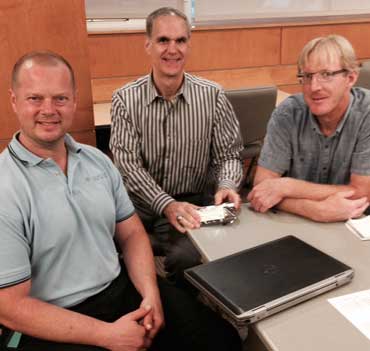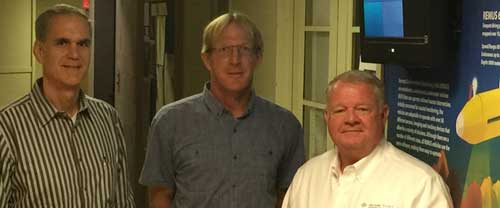Any independent sales agency that describes itself as a “Marriage Counselor for Manufacturers” had better be good. Well, that’s what JD Technologies, LLC, does — and they are just that — very good at what they do.

A key element of the discovery session is technical expertise. Rich Wheatley (left) is a Sparton Field Application Engineer whose expertise is needed to make sure the product is meeting all the customer’s technical requirements. Synonymous with consultative selling is technological complexity. Rich’s expertise and Sparton’s team of engineers are needed not only to sell but to develop new products, support production and solve any issues that come up in the field.
Here’s what the Middleton, Massachusetts-based agency does: Provides sales and marketing services to a group of high-quality, complementary manufacturers of engineered services and products who serve the industrial, aerospace, military, defense and medical industries. The agency develops long-term relationships with key customers who value the consultative style of selling. The company’s focus is on the six New England States that include Connecticut, Maine, Massachusetts, New Hampshire, Rhode Island and Vermont.
When asked about the agency’s role as a “Marriage Counselor,” MANA member and company president John Knott, CPMR, laughs and explains the description this way: “Just as so many other independent agencies, JD Technologies used to do a lot of cold calling,” says Knott. “About four years ago, after reading a book entitled No More Cold Calling, by Joanne Black, we decided to change our approach.” (Published in 2006, No More Cold Calling presents a five-step referral selling methodology that allows salespeople to differentiate themselves from their competitors. The book is available on Amazon.)
Knott explains that among the many recommendations made in the book was the need for a move from cold calling to referral selling. And a part of the author’s message was that an integral element of referral selling was the need to get attention for what you do. “Call it a part of your elevator speech or whatever, but what you’ve got to do is get the prospect’s attention and get them to laugh. Experts claim that with your elevator speech, you’ve got 30-45 seconds, sometimes less time, to get the prospect’s attention. If you lose them during that time frame, chances are they’re never coming back. That’s why when someone asks me what I do for a living, I tell them I’m a marriage counselor for manufacturers. And believe me, it works. They immediately laugh and become engaged about what you’re telling them. It’s funny, but it’s effective.”
Knott credits his agency’s marketing department for coming up with the marriage counselor term, adopting it over what he says was his initial suggestion of “Adult Day Care.”

John Knott, President of JD Technologies, LLC (left) with Reed Christenson, Software Engineering lead at Woods Hole Oceanographic Institute in Woods Hole, MA (center) and Joe Bannon, Business Development Manager for Sparton NavEx (right). Sparton makes a MEMS based inertial system that is used on underwater unmanned vehicles as well as other applications that require accurate heading. Discovery sessions like this are very important as part of the consultative selling process where we need to fully understand what the customer is trying to accomplish so we can help them do it better.
The Move to Sales and Marketing
There’s more to Knott’s and JD Technologies’ story than just the marriage counselor tag, however. According to Knott here’s how it all began: Armed with a bachelors and two masters degrees, he began his career with GE in Lynn, Massachusetts, as a product design engineer and graduated from the company’s Engineering Career Development Program. This was followed by senior design/new product design responsibility with United Technologies Corporation where he transitioned into marketing and sales. “When I began, what I wanted to be was an engineer. But then something significant happened that changed everything. We were in the midst of designing a flight control actuator for missile applications for three customers. This job had a long gestation period — three years — and required the exchange of a great deal of information and adherence to military requirements. We were really pushing the envelope with this job. Our company decided that we were going to partner with a competitor in order to beat out the number-one company for the order. Ultimately, we won the order, but it was then that I decided rather than just being the design engineer, I wanted to be the one who was driving the train. I wanted to be in front of the customer doing the marketing development and sales. It was shortly after that experience that I went into sales with my own agency.”
Knott opened the doors to JD Technologies in in 2004. As mentioned previously, the agency serves the needs of principals and customers in four diverse industries: aerospace, military and defense, medical and industrial. Knott maintains that while the industries are quite different, they are complementary at the same time. “They’re all very complex and highly regulated. Selling requires long gestation periods. Customers require a consultative selling approach and there are multiple groups within the organizations that play a major role in decisions.
When it comes to finding principals to fulfill the needs of customers, Knott says “Most of our principals have found us through referrals, and we get a great number of inquiries through our membership in MANA. In addition, we’ve been able to find principals at industry and customer conventions.”
Avoiding Surprises
When asked if he encountered any unforeseen surprises when he opened his own doors after leaving the corporate world, Knott points a finger in the direction of preparation as a reason nothing really surprised him. “When you prepare, as we did, you really try to cover all the bases. Of great assistance in the preparation were two things:
- First, I was lucky enough to have a rep mentor who owned his own firm. He told me a lot about what I might expect.
- Second, was my membership in MANA. The association, which I joined in 2005, was a huge help to me in starting my business.”
Knott is convinced that he did all he could prior to opening his doors. “I was extremely fortunate that I had the assistance of a mentor and the backing of MANA. They both allowed me to get my homework done. As a result, once I opened the business I never really experienced any cash-burn time.”
Over the course of more than a decade he’s been in business, Knott acknowledges that a number of changes have made the practice of being an agent different from when he began. “Look at technology and communication, for instance. I can remember the days when we were armed with large Atlases to help us find our destinations. Then along came MapQuest and that was huge. And today we’ve all got GPS. You just plan your route and print it out and you’re all set. And how about all the mobile devices we use to stay in constant touch?”
If any discussion about changes in the business of being an independent representative is to be complete, it should certainly include mention of social media, and that’s something that Knott and JD Technologies are on top of.
“On the subject of social media, perhaps the first things we’re looking at are our web site (www.jdtechsales.com) and search engine optimization. As a rep firm, we represent our principals. As a result, we want all of our principals to conduct search engine optimization. If they do the best possible job they can in this area, and we do it as well, then aren’t we competing with each other? We have some of the same phrases and words that they use and that results in this competition. With the upgrade that we’re working on, we want to make sure that whatever we do we complement — not compete with — their efforts.
“At the same time, we’re looking to integrate our social media efforts with whatever we do. That all has to do with providing valuable content for our customers. Once our upgrade in our efforts is complete, then we’ll have to measure how we’re performing in that area. I’ll have to admit that that’s something we can’t measure right now, but we will be able to in the future.”
Getting to See the Customer
Technological and communication tools aren’t the only differences Knott points to in his time as an independent agent. He maintains that there’s a huge difference today in how relationships are established and maintained — and that’s something today’s independent representative has to come to terms with.
“It’s extremely difficult to get in to see millennials. They just don’t want to talk to you. We’re finding that more and more companies are hiding behind their mobile devices and depend on email and texting for their communications. To combat that, you’re got to go back to the basics in terms of establishing relationships. You start with face-to-face contact, which is difficult. Once you do that, you’ll get people in the company to meet with you.”
If technological and cultural changes remain a challenge that the agency must address, Knott adds that being concerned about the job you’re doing for your principals always remains a challenge. “Am I selling enough? Can I sell more? Am I selling too much? These are all questions that you constantly ask. At the same time, you’re always striving to do better and take your performance to the next level.”
What the agency executive is referring to here is the representative’s ability to constantly provide value to principals and customers. “As I look back over our agency’s history, perhaps the one thing I’d do a bit differently is to emphasize to our principals the value that we bring. In addition to selling products to our customers, it’s our job to always sell our principals on the value of the job we do for them. What I’m referring to here is not something you have to write down and send to your principals. All it is really is the need to have that conversation with your principal. This isn’t something that should be treated lightly; rather, it’s all about communicating and building rapport with the manufacturers you work with.
“Here’s what I’d recommend: start the conversation early. Ask them if they’ve ever worked with a rep before. If the answer is no, educate them about what you do. Make them understand your value.
“Treat this communication/education process the same way you would your sales approach with customers. I’m not sure I did this from the very beginning and I took some lumps as a result.”
In closing Knott is quick to recommend being an independent manufacturers’ representative as a career choice. But he’s careful to advise that “You had better make that decision for the right reasons. Sure, you can do it to earn an income, but don’t do it because you want to become rich. I did it because I wanted to be independent.”
MANA welcomes your comments on this article. Write to us at [email protected].

